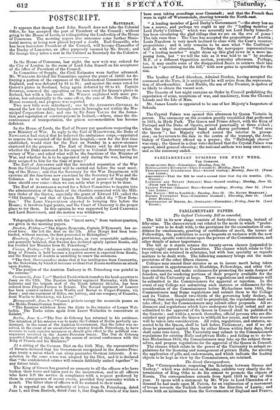In the House of Commons, last night, the new writ
was ordered for the City of London in the room of Lord John Russell on his acceptance of the office of President of the Council.
In Committee of Supply, the Civil Estimates were further advanced. Mr. Wrimiams divided the Committee against the grant of 3463/. for de- fraying a portion of the expenses of the Ecclesiastical Commissioners for England, and was defeated by 91 to 56; and against the sums voted for Queen's plates in Scotland, being again defeated by 68 to 43. Captain &ODELL, renewed the opposition on the sum voted for Queen's plates in Ireland, but with a like result. Mr. WiLsoic explained with more pre- cision, but substantially to the same effect, the case of Mr. Greville; the House resumed, and progress was reported. Two new bills were introduced ; one by the Arrow:Ey-GEN-raw, to amend the law for making borough-rates in boroughs not within the Mu- nicipal Corporations Act ; and one by Sir JOHN YOUNG for the forma- tion and regulation of convict-prisons in Ireland,—where, since the dis- continuance of transportation, the prison accommodation has become deficient.
In the House of Lords, the Earl of DERBY put questions respecting the new Ministry of War. In reply to the Earl of HARDWICKE, the Duke of NEWCASTLE had stated that he believed the ambulance corps,—appointed to remove the wounded off the field into hospital,—now for the first time established, would start for the East on Sunday in a screw-steamer chartered for the purpose. The Earl of DERBY said he did not know whether the Duke answered in his capacity as Colonial Secretary or Se- cretary of War ; and asked what will be the functions of the Minister of War, and whether he is to be appointed only during the war, having no duty assigned to him for the time of peace ? The Earl of ABERDEEN said that the intended separation of the War from the Colonial Department will be carried out before the next meet- ing of the House ; and that the Secretary for the War Department will exercise all the functions now exercised by the Secretary for War and the Colonies. As to what may happen in time of peace—if happily that time should ever come—then we can settle what is proper to be done.
The Earl of ALBEMARLE moved for a Select Committee to inquire into the administration of the funds of the charities connected with the Mili- tary Order of the Garter, especially the grant of Edward III. called the "Old Dotation," and that of Queen Elizabeth called the "New Dote- tion." The LORD CHANCELLOR objected to bringing this before the House; it involves legal points, and the Court of Chancery is the proper place to try them. In this opinion he was supported by Lord CARPBELL and Lord Bnouorcem, and the motion was withdrawn.


























 Previous page
Previous page